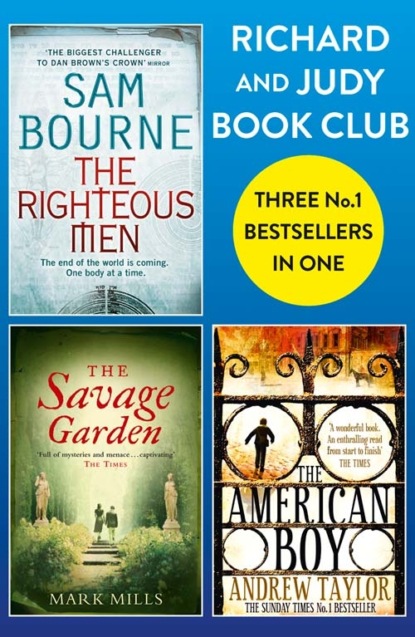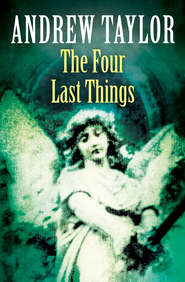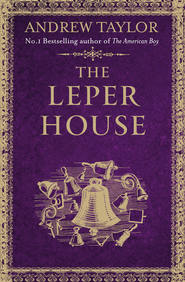По всем вопросам обращайтесь на: info@litportal.ru
(©) 2003-2024.
✖
Richard and Judy Bookclub - 3 Bestsellers in 1: The American Boy, The Savage Garden, The Righteous Men
Автор
Год написания книги
2018
Настройки чтения
Размер шрифта
Высота строк
Поля
“But we cannot let it pass.”
“We cannot prevent it.”
“If the older boys would but exert some authority over the younger ones –”
Dansey shook his head. “This is not a public school. We do not have a tradition of self-governance by the boys.”
“If I went to Mr Bransby, might he not expel them or at least discipline them – Quird and Morley, I mean?”
“You forget, my dear Shield: the true aim of this establishment is not an educational one. Considered properly, it is nothing but a machine for making money. That is why Mr Bransby has sunk his capital in it. That is why you and I are sitting here drinking weak coffee at Mr Bransby’s expense. Both Quird and Morley have younger brothers.” Dansey’s lips twisted into their Janus-like frowning smile. “Their fathers pay their bills.”
“Then is there nothing to be done?”
“You can beat the wretched boys so soundly that you reduce their ability to persecute their unfortunate friend. At least I can be of assistance in that respect.”
At eleven o’clock, after the second session of morning school, I flogged Morley and Quird harder than I had ever flogged a boy before. They did not enjoy it but they did not complain. Custom blunts even pain.
Later, I caught sight of Charlie Frant in the playground. Half a dozen boys had grouped around him in a ragged circle. They tossed the hat from one to the other, encouraging him to make ineffectual grabs for it. The hat had lost its tassel. Some wag had contrived to pin it on the back of the olive-green coat.
“Donkey,” they chanted. “Who’s a little donkey? Bray, bray, bray.”
When lessons resumed after dinner, Frant was not at his desk. He had hidden himself away to lick his wounds. I decided that if Lord Nelson could turn a blind eye to matters he did not wish to see, then so could I. I did not, however, turn a blind eye to either Quird or Morley. Their work, never distinguished, withered under the unremitting attention that I bestowed upon it. I gave them both the imposition of copying out ten pages of the geography textbook by the following morning.
Towards the end of afternoon school, the manservant came from Mr Bransby’s part of the house and desired Dansey and myself to wait upon his master without delay. We found him in his study, pacing up and down behind his desk, his face dark with rage and a trail of spilt snuff cascading down his waistcoat.
“Here’s a fine to-do,” he began without any preamble, before I had even closed the door. “That wretched boy Frant.”
“He has absconded?” Dansey said.
Bransby snorted.
“Not worse, I hope?” There was the barest trace of amusement in Dansey’s voice, like an intellectual whisper pitched too low for Mr Bransby’s range of comprehension. “He has – harmed himself?”
Bransby shook his head. “It appears that he strolled away, as cool as a cucumber, after the boys’ dinner. He walked a little way and then found a carrier willing to give him a ride to Holborn. I understand that Mrs Frant is away from home but the servants at once sent word to Mr Frant.” He waved a letter as though trying to swat a fly. “His stable boy brought this.”
He took another turn in silence up and down the room. We watched him warily.
“It is most vexing,” he continued at length, glowering at each of us in turn. “That it should concern Mr Frant – the very man we should study to please in every particular.”
“Has he settled on withdrawing the boy?” Dansey asked.
“We are spared that, at least. Mr Frant wishes his son to return to us. But he demands that the boy be suitably chastised for his transgression so that he apprehends that the discipline of the school is firmly allied to paternal authority. Mr Frant desires me to send an under-master to collect his son, and he proposes that the under-master should flog the boy in his, that is to say Mr Frant’s, presence and in the boy’s own home. He suggests that in this way the boy will realise that he has no choice but to knuckle down to the discipline of the school and that by this he will learn a valuable lesson that will stand him in good stead in his later life.” Bransby’s heavy-lidded eyes swung towards me. “No doubt you were about to volunteer, Shield. Indeed, my choice would have fallen on you in any case. You are a younger man than Mr Dansey, and therefore have the stronger right arm. There is also the fact that I can spare you more easily than I can Mr Dansey.”
“Sir,” I began, “is not such a course –?”
Dansey, standing behind me and to the left, stabbed his finger into my back. “Such a course of action is indeed a trifle unusual,” he interrupted smoothly, “but in the circumstances I have no doubt that it will prove efficacious. Mr Frant’s paternal concern is laudable.”
Bransby nodded. “Quite so.” He glanced at me. “The stable boy has ridden back to town with my answer. The chaise from the inn will be here in about half an hour. Be so good as to discuss with Mr Dansey how he should best discharge your evening duties as well as his own.”
“When will it be convenient for me to wait upon Mr Frant?”
“As soon as possible. You will find him now at Russell-square.”
A moment later, Dansey and I went through the door from the private part of the house to the school. A crowd of inky boys scattered as though we had the plague.
“Did you ever hear of anything so unfeeling?” I burst out, keeping my voice low for fear of eavesdroppers. “It is barbaric.”
“Are you alluding to the behaviour of Mr Frant or the behaviour of Mr Bransby?”
“I – I meant Mr Frant. He wishes to make a spectacle of his own son.”
“He is entirely within his rights to do so, is he not? You would not dispute a father’s right to exercise authority over his child, I take it? Whether directly or in a delegated form is surely immaterial.”
“Of course not. By the by, I must thank you for your timely interruption. I own I was becoming a little heated.”
“Mr Frant and his bank could purchase this entire establishment many times over,” Dansey observed. “And purchase Mr Quird and Mr Morley as well, for that matter. Mr Frant is a fashionable man, too, who moves in the best circles. If it is at all possible, Mr Bransby will do all in his power to indulge him. It is not to be wondered at.”
“But it is hardly just. It is the boy’s tormentors who deserve chastisement.”
“There is little point in railing against circumstances one cannot change. And remember that, by acting as Mr Bransby’s agent in this, you may to some degree be able to palliate the severity of the punishment.”
We stopped at the foot of the stairs, Dansey about to go about his duties, I to fetch my hat, gloves and stick from my room. For a moment we looked at each other. Men are strange animals, myself included, riddled with inconsistencies. Now, in that moment at the foot of the stairs, the silence became almost oppressive with the weight of things unsaid. Then Dansey nodded, I bowed, and we went our separate ways.
Chapter 10 (#ulink_665d9d25-17ef-5666-8a3d-8f584b1854a3)
I come now to an episode of great significance for this history, to the introduction of the Americans.
Providence in the form of Mr Bransby decreed I should witness a scene of comings and goings in Russell-square. A man believes in Providence because to do otherwise would force him to see his life as an arbitrary affair, conducted by the freakish rules of chance, no more under his control than a roll of the dice or the composition of a hand of cards. So let us by all means believe in Providence. Providence arranged matters so that I should call at Mr Frant’s on the same afternoon as the Americans arrived.
The shabby little chaise from the inn brought me to London. The vehicle creaked and groaned as though afflicted with arthritis. The seat was lumpy, the leather torn and stained. The interior smelt of old tobacco and unwashed bodies and vinegar. The ostler who was driving me swore at the horse, a steady stream of obscenity punctuated by the snapping of the whip. As we drove, the daylight drained away from the afternoon. By the time we reached Russell-square, the sky was heavy with dark, swirling clouds the colour of smudged ink.
My knock was answered by a footman, who showed me into the dining room to wait. Because of the weather and the lateness of the afternoon, the room was in near darkness. I turned my back on the portrait. Rain was now falling on the square, fat drops of water that smacked on to the roadway and tapped like drumbeats on the roof of the carriages. I heard voices in the hall, and the slam of a door.
A moment later the footman returned. “Mr Frant will see you now,” he said, and jerked his head for me to follow him.
He led me across the marble chequerboard of the hall to a door which opened as we approached. The butler emerged.
“You are to desire Master Charles to step this way,” he told the footman.
The footman strode away. The butler took me into a small and square apartment, furnished as a book-room. Henry Frant was seated at a bureau, pen in hand, and did not look up. The shutters were up and candles burned in sconces above the fireplace and in a candelabrum on a table by the window.
The nib scratched on the paper. The candlelight glinted on Frant’s signet ring and the touches of silver in his hair. At length he sat back, re-read what he had written, sanded the paper, and folded it. As he opened one of the drawers of the bureau, I noticed that he was missing the top joints of the forefinger on his left hand, a blemish on his perfection which pleased me. At least, I thought, I have something that you have not. He slipped the paper in the drawer.
“Open the cupboard on the left of the fireplace,” he said without looking at me. “Below the shelves. You will find a stick in the right-hand corner.”
I obeyed him. It was a walking-stick, a stout malacca cane with a silver handle and a brass-shod point.
“Twelve good hard strokes, I think,” Mr Frant observed. He indicated a low stool with his pen. “Mount him over that, with his face towards me.”











